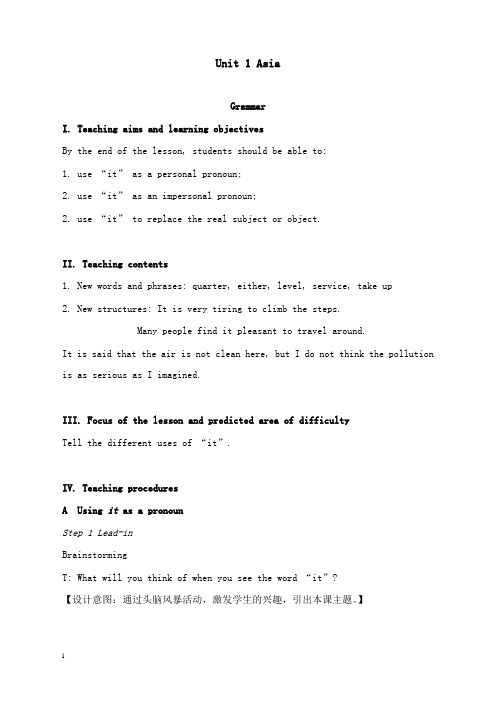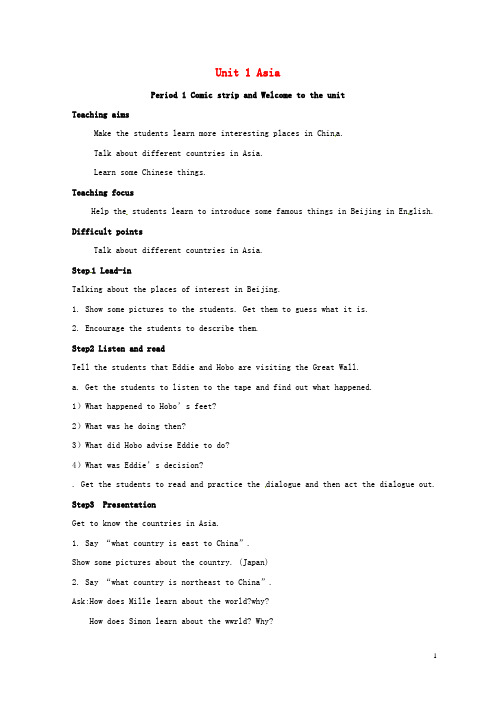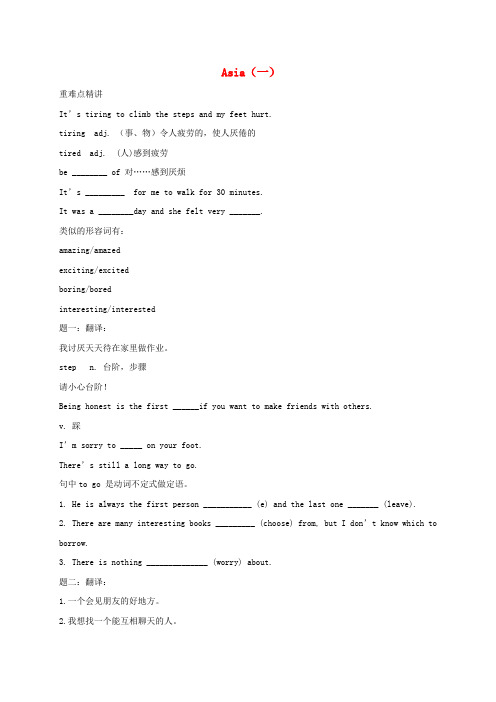2018九年级英语下册 Unit 1 Asia(一)讲义 (新版)牛津版
最新牛津译林版九年级下册unit 1《asia》教案1.doc

Unit 1 AsiaGrammarI. Teaching aims and learning objectivesBy the end of the lesson, students should be able to:1. use “it” as a personal pronoun;2. use “it” as an impersonal pronoun;2. use “it” to replace the real subject or object.II. Teaching contents1. New words and phrases: quarter, either, level, service, take up2. New structures: It is very tiring to climb the steps.Many people find it pleasant to travel around.It is said that the air is not clean here, but I do not think the pollution is as serious as I imagined.III. Focus of the lesson and predicted area of difficultyTell the different uses of “it”.IV. Teaching proceduresA Using it as a pronounStep 1 Lead-inBrainstormingT: What will you think of when you see the word “it”?【设计意图:通过头脑风暴活动,激发学生的兴趣,引出本课主题。
】Step 2 Presentation1. Use it for animals and lifeless thingsT: Now, let’s play a guessing game. It is a tourist attraction. It lies in the northern part of China. It is a wall which was built to defend the enemy. What is it?S: It is the Great Wall.T: It is a kind of animal. It is very lovely. It wears big black glasses on its face. What is it?S: It is a panda.T: It is a type of transportation. It was invented by an Englishman. It has two wheels and iswidely used in China. What is it?S: It is a bike.T: It is a common thing. It looks like a mushroom. It is used on rainy days. What is it?S: It is an umbrella.T: So, What does “it” refer to?S: We use it for animals and lifeless things.【设计意图:利用学生喜欢的猜谜游戏,激发他们的学习兴趣,在不知不觉中过渡至语法学习,将it指代动物或者无生命的事物的用法自然呈现。
九年级英语下册Unit1AsiaReading1教案新版牛津版

Unit1 Reading15) Why was the Great Wall built in ancient times?6) Is Guilin in the north or south of China?7) Are there mountains and rivers in Guilin?8) How can you travel in Guilin?Step3 Further readingMatch the placesthe Palace Museum next to the Palace MuseumTian’anmen Square in the middle of Beijing the Summer Palace in the north of Beijingthe Great Wall in the north-west of BeijingRead it again and do some true or false questions1) Beijing is in southern China.2) Tian’anmen Square is close to the Forbidden City.3) The Great Wall is built around the Forbidden City.4) The Reed Flute Cave is in eastern Guilin.5) You can find man-made lakes inside the Reed Flute Cave.6) We can take a boat trip along Li RiverRead the two parts carefully to get some details.1) Match the name with the correct information.2) Ask some questions and get the students to answer.3) Fill in blanks according to the passage.Step4 Consolidation1. Do some exercises on the exercise book.2. Post-teachingDemands(要求):1) Group one asks questions about Beijing and group two answers them.2) Group two asks questions about Guilin and group one answers them. Rules:1) Time: only one minute.。
牛津译林版英语九下Unit 1《Asia》(Integrated skills)ppt课件

Listen to learn about the exchange students’ trip to Japan. To learn to talk about an Asian country To learn the new words and useful expressions: Japanese, state Japan is the second country we are going to visit in Asia.
9 in the morning Tokyo
25th February noon
shopping sites is telling the A2Miss Thompson National Museum exchange students works of art about their trip to Japan. Kevin notes. coach Mount Fuji is making skiing Listen carefully and help Kevin
1.Finish the exercises in Learning English. 2. Preview Study skills on page 17. 3. Preview Task on page 18-19.
complete his notes. (P 15)
culture food
at 9 in the morning 4 days Tokyo sites shopping
Kevin is writing about the TokyoA3 National Museum works of art exchange students’ trip to Japan. coach Mount Fuji Help him complete highest it. Use the skiing
牛津译林版九年级英语下册 Unit 1 Asia 知识点讲解课件

It was a __t_ir_i_n_g__day and she felt very _t_ir_e_d___.
那是疲劳的一天,她感到很累。 拓展
amazing/amazed; exciting/excited
boring/bored; interesting/interested
A. lying; lay; laid B. lying; lied; laid
C. lie; lied; lay
D. lay; lied; lain
(3) When she came home several days later, she found that
all things still __A___ where she had _____ them.
Neither he nor she _w__a_s_ (was/were) at home. Either my father or my brothers _a_r_e__ (is/are) coming.
注意: both…and … 一般与复数谓语连用, either…or…; neither… nor… 则根据就近原则。
做主语时, both后的谓语动词用复数, either, neither后的谓语动词用单数。
both either neither
注意三者之间的转换: 1. There are many beautiful trees on _e_i_th_e__r_
side of the street. =There are many beautiful trees on __b_o_t_h__ sides of the street.
3. The main _a_t_tr_a_c_t_io_n_ of the dress is its style.
九年级英语下册Unit 1 Asia Period 1教案 新版牛津版

Unit 1 AsiaPeriod 1 Comic strip and Welcome to the unitTeaching aimsMake the students learn more interesting places in Chin a.Talk about different countries in Asia.Learn some Chinese things.Teaching focusHelp the students learn to introduce some famous things in Beijing in En glish. Difficult pointsTalk about different countries in Asia.Step1 Lead-inTalking about the places of interest in Beijing.1. Show some pictures to the students. Get them to guess what it is.2. Encourage the students to describe them.Step2 Listen and readTell the students that Eddie and Hobo are visiting the Great Wall.a. Get the students to listen to the tape and find out what happened.1)What happened to Hobo’s feet?2)What was he doing then?3)What did Hobo advise Eddie to do?4)What was Eddie’s decision?. Get the students to read and practice the dialogue and then act the dialogue out. Step3 PresentationGet to know the countries in Asia.1. Say “what country is east to China”.Show some pictures about the country. (Japan)2. Say “what country is northeast to China”.Ask:How does Mille learn about the world?why?How does Simon learn about the wwrld? Why?Work in pairs to practice the dialogue.Sample conversation :S1:How do you learn about the world?Show some pictures about the country. (Korea)3. Say “what country is north to China”.Show some pictures about the country. (Mongolia)4. Say “what country is southwest to China”.Show some pictures about the country. (India)Encourage the students to say something about these countries.Step4 Showing and discussionGet to know Chinese things.1. Show the pictures about Chinese things such as: dragon dance, Chinese opera, chopsticks, Chinese knot, Chinese paper cut and Chinese kung fu.2. Encourage the students t o talk about the pictures.3. Encourage the students to say m ore about Chinese things.4. Get the students to talk about some famous Chinese things.Step 5 PracticeFinish the exercises in Part A.Talk about the places of interest in China.Step 6 ConsolidationWrite a short passage to describe one of the famous places in China and choose a piece o f writing to read in cla s s.Step5:Homework。
新牛津版九年级英语下册Unit1 Asia Reading 1课件(共28张PPT)

Because it has wonderful buildings and art treasures inside. _________________________________
The Second Place Tian’anmen Square
Tian’anmen Square
1. Is it the biggest square in the world? Yes, it is. _______________
b _______
a pay some money to use something for a short time
e 2 attraction (line 18) _______
3 wonder (line 21) _______ d _______ f _______ c _______ a
b the rule of a country or several countries c a large hole in the side of a hill or underground
north-west the ___________of Beijing. It is a Chinese garden set in a large _________ natural __________. landscape ________ The emperors used to spend summer there. _________
2. What can we see there?
We can watch the raising of _________________________ the national flag.
The Third
九年级英语下册Unit1Asia(一)讲义(新版)牛津版

Asia(一)重难点精讲It’s tiring to climb the steps and my feet hurt.tiring adj. (事、物)令人疲劳的,使人厌倦的tired adj. (人)感到疲劳be ________ of 对……感到厌烦It’s _________ for me to walk for 30 minutes.It was a ________day and she felt very _______.类似的形容词有:amazing/amazedexciting/excitedboring/boredinteresting/interested题一:翻译:我讨厌天天待在家里做作业。
step n. 台阶,步骤请小心台阶!Being honest is the first ______if you want to make friends with others.v. 踩I’m sorry to _____ on your foot.There’s still a long way to go.句中to go 是动词不定式做定语。
1. He is always the first person ___________ (e) and the last one _______ (leave).2. There are many interesting books _________ (choose) from, but I don’t know which to borrow.3. There is nothing ______________ (worry) about.题二:翻译:1.一个会见朋友的好地方。
2.我想找一个能互相聊天的人。
go on to do sth.一事做完,接着做另一件事go on doing sth.事情暂停后继续做;一直做某事题三:1)After a short break ,he went on _________(read) the rest of the text.2)After reading the novel, he went on _________(write) an article.used to do sth. 过去常做某事,现在不了be used to (doing) sth. 习惯于某事或习惯于做某事get/bee used to (doing) sth. 变得习惯于某事或习惯于做某事,往往含有“克服困难去适应”之意。
九年级英语下册 Unit 1 Asia Grammar课件 (新版)牛津版

It took about two hours to go to Shanghai by coach.
It was surprising that there were so many people in Shanghai in the subway station.
It was easy to get lost in such a big city.
Unit 1 Asia Grammar
information technology
…
It is a tourist attraction.
It lies in the northern part of China.
It is a wall which was built to defend the enemy.
It is a common thing. It looks like a mushroom. It is used on rainy days.
We use it for animals and lifeless things.
My aunt will have a baby soon. She hopes it will be a boy.
once lived in the White House for several years It is Hillary Clinton, the wife of Bill Clinton.
—Who was calling you on the phone just now?
—__I_t_ was my cousin.
3. What’s the distance from Beijing to Shanghai?
4. What time was it then?
- 1、下载文档前请自行甄别文档内容的完整性,平台不提供额外的编辑、内容补充、找答案等附加服务。
- 2、"仅部分预览"的文档,不可在线预览部分如存在完整性等问题,可反馈申请退款(可完整预览的文档不适用该条件!)。
- 3、如文档侵犯您的权益,请联系客服反馈,我们会尽快为您处理(人工客服工作时间:9:00-18:30)。
Asia(一)重难点精讲It’s tiring to climb the steps and my feet hurt.tiring adj. (事、物)令人疲劳的,使人厌倦的tired adj. (人)感到疲劳be ________ of 对……感到厌烦It’s _________ for me to walk for 30 minutes.It was a ________day and she felt very _______.类似的形容词有:amazing/amazedexciting/excitedboring/boredinteresting/interested题一:翻译:我讨厌天天待在家里做作业。
step n. 台阶,步骤请小心台阶!Being honest is the first ______if you want to make friends with others.v. 踩I’m sorry to _____ on your foot.There’s still a long way to go.句中to go 是动词不定式做定语。
1. He is always the first person ___________ (come) and the last one _______ (leave).2. There are many interesting books _________ (choose) from, but I don’t know which to borrow.3. There is nothing ______________ (worry) about.题二:翻译:1.一个会见朋友的好地方。
2.我想找一个能互相聊天的人。
go on to do sth.一事做完,接着做另一件事go on doing sth.事情暂停后继续做;一直做某事题三:1)After a short break ,he went on _________(read) the rest of the text.2)After reading the novel, he went on _________(write) an article.used to do sth. 过去常做某事,现在不了be used to (doing) sth. 习惯于某事或习惯于做某事get/become used to (doing) sth. 变得习惯于某事或习惯于做某事,往往含有“克服困难去适应”之意。
be used to do sth. 被用来做某事be used for doing sth.1. Wood is used for _________(make) paper.= Wood is used ________(make) paper.2. My grandfather _________ living in the village.3. The food here is not so tasty but you will _____________that.题四:翻译:1.我原来起床很早。
2.我习惯晚饭后到公园溜溜弯。
3.不要担心,你慢慢就会适应的。
turn v.turn...into... 把……变成……turn around 转过来turn to 转向;翻到(书的某一页);向某人求救22turn left/right 左转/右转turn red 变红turn out 结果是turn up 调高turn down 调低turn on 打开turn off 关掉turn n.wait for your turn 等轮到你take turns/take it in turns 按顺序轮流It’s one’s turn to do sth. 该轮到某人做某事了。
题五:翻译:1.该轮到你去打扫教室了。
2. As a famous cook, he can ______ these things ____ some delicious dishes quickly.3. He ______________ his head as he heard someone calling him.It is worth a visit. 它非常值得一游。
be worth sth.be (well) worth doingwatch the raising of the national flag 观看升国旗raise vt. ( raised, raised, raising, raises)举起,提高,升起,募集rise vi. ( rose, risen, rising, rises ) 上升题六:填空:1.The music is well worth ______________(listen).2.The clock is hardly worth ___________(repair). Why not throw it away?3.The teacher said the sun __________in the east.4.He _________his hands and asked a questio n.5.He says the best way to __________ money is to sell newspapers.6.The price of the house________________recently.3lie (lay lain lying lies) 位于,躺,平放lie (lied lied lying lies) 说谎,谎言(n.)lay (laid laid laying lays) 放置,下蛋题七:I found a letter __________ on the floor when I came into the classroom.A. lyingB. layC. lieD. lies语法讲解一、it作人称代词1. 指代事物。
2.指代人。
主要用于指婴儿或未知的人。
3. 代替某些代词。
代词 it 还可用于代替指示代词this, that 以及复合不定代词 something,anything等。
二、it作非人称代词1. it用于指时间、距离、价值、自然现象、环境等。
2. it指代前面提到过的或谈话双方都明白的事情或情况。
it组成的惯用语:别紧张,放松点做到,成功信不信由你算了吧这就对了,就这样不用谢由你决定三、it作形式主语当不定式、动名词、从句等用作句子主语时,为保持句子平衡,通常把真正的主语放在句末,而在句首使用形式主语it。
题八:翻译:1.这里就是长城,它很美。
2.那边有个小宝宝,真可爱。
443.这/那是什么?4.这/那是一个橘子。
5.天越来越黑。
6.今天星期几?7.— Excuse me, I wonder if you can help me?— Sure. _______?A. What helpB. What is thisC. What is itD. What do you want8.— According to my grandma, it is a good idea to eat chic ken soup when you have a cold. — _____________, scientists agree with her.A. Sooner or laterB. Once in a whileC. To be exactD. Believe it or not翻译:9.走路到学校会花费他半个小时。
10.你能帮助我真好。
11.据说他要去国外了。
12.The doctor thought______ would be good for you to have a holiday.A. thisB. thatC. oneD. it题九:能力提升与拓展Mr. and Mrs. Smith had always spent their summer holidays in New Jersey(新泽西)in the past, staying in a small inn (旅店) at the foot of a hill.One year, however, Mr. Smith made a lot of money in his business, so they decided to go to London and stay at a really good hotel while they went touring around that famous5city.They flew to London and arriv ed at their hotel late one evening. They had expected that they would have to go to bed hungry, because in that small inn in New Jersey, no meals were served after seven. They were surprised when the waiter asked whether they would take dinner there that night. “Are you still serving dinner?” asked Mr. Smith. “Yes, certainly, sir,” answered the waiter. “We serve it until half past nine.”“What are the times of meals then?” aske d Mr. Smith.“Well, s ir,”answered the waiter. “We serve breakfast from seven to half past eleven in the morning, lunch from twelve to three in the afternoon, tea from four to five, and dinner from six to half past nine.”“But that hardly leaves any time for us to see the sights of London,”said Mr. Smith.1. Mr. and Mr s. Smith had always spent their holidays in _______.A. New YorkB. LondonC. New JerseyD. Washington2. When Mr. and Mrs. Smith had a lot of money, they decided to go to _______.A. their hometownB. the capital of EnglandC. New JerseyD. a small city in England3. They went to London by _______ .A. seaB. planeC. trainD. bus4. From the story we know that this was the _______ time for Mr. and Mrs. Smith to go to London.A. firstB. secondC. thirdD. fourth5. What does the sentence “But that hardly leaves any time for us to see the sights of London” mean?A. We can go to see the sights of London at any time.B. We have enough time to see the sights of London.C. We can see more sights of London.D. We have little time to see the sights of London.66Asia(一)题一:I am tired of staying at home and doing my homework.题二:1.A good place to meet friends.2.I want to find someone to talk with.题三:1.reading;2. to write题四:1.I used to get up early.2.I am used to taking a walk in the park after supper.3.Don’t worry. You will get used to it gradually.题五:1.It’s your turn to clean the classroom.2.turn…into…3.turn around题六:1.listening; 2.repairing; 3.rises; 4.raised; 5.raise; 6.is risi ng题七:A题八:1.This is the Great Wall. It is beautiful.2.There is a baby over there. It’s cute.3.What’s this/that?4.It’s an orange.5.It’s getting darker and darker.6.What day is it today?;7.C;8.D9.It takes him half an hour to walk to school.10.It’s so nice of you to help me.11.It’s said that he will go abroad. ; 12.D题九:1.C 2.B 3.B 4.A 5.D7。
